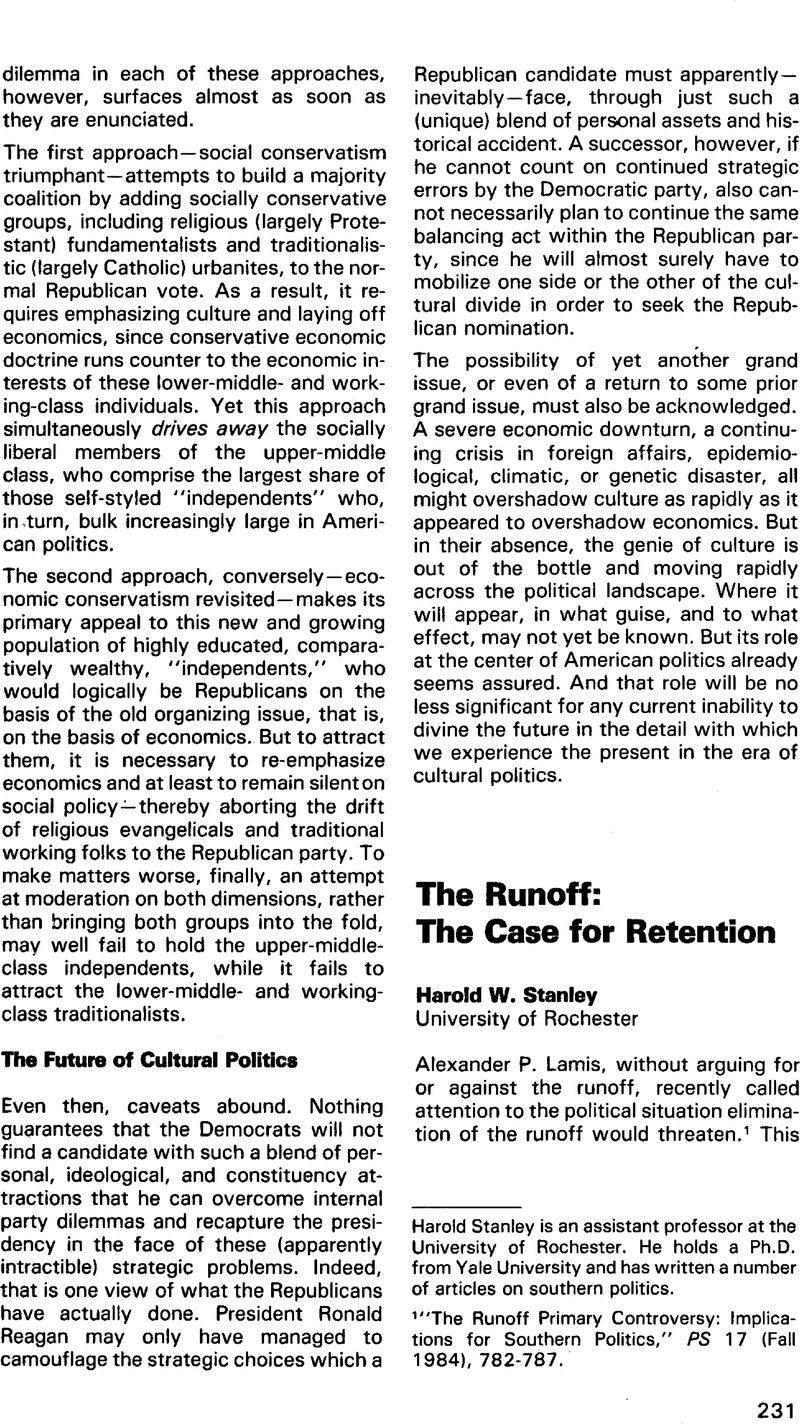Published online by Cambridge University Press: 25 November 2022

1 “The Runoff Primary Controversy: Implications for Southern Politics,” PS 17 (Fall 1984), 782–787.
2 Eight states of the former Confederacy now have the runoff. The states presently without the runoff are Louisiana, Tennessee, and Virginia. Oklahoma also has a runoff but its relatively small black population sets it apart from the other eight states.
3 Newsweek, 9 April 1984, 34; and Roberts, Steven, “Ruing Jackson's Stand on Runoffs,” The New York Times, 16 April 1984.Google Scholar
4 Gailey, Phil, “Runoff Issue Puts Democrats on Spot,” The New York Times, 3 May 1984, b13.Google Scholar
5 Bass, Jack, “Democrats: Here's a 40% Solution,” Washington Post, 22 April 1984, d1–d2.Google Scholar
6 Such differences could not be explained by other considerations such as the degree of Republican competition in the state. Canon, Bradley C., “Factionalism in the South: A Test of Theory and a Revisitation of V. O. Key,” American Journal of Political Science, vol. 22, November 1978, 833–848.CrossRefGoogle Scholar
7 Advocates of abolition of the runoff have high estimates of the Democratic party's strength and resilience. For instance, Mickey Michaux, the most prominent victim of what some consider the runoff's racial bias, stated, “In North Carolina, Democrats outnumber Republicans 3-to-1. It'll take a long time for the Republican Party to catch up. So what if 400,000 or 500,000 whites defect?” (Congressional Quarterly Weekly, 5 May 1984, 1035). In North Carolina, Democrats have won 8 of 9 gubernatorial elections and 12 of 15 contests for the U.S. Senate since 1948, the Democratic plurality exceeded 500,000 only in the 1976 gubernatorial election (517,191). Democrats nonchalantly writing off one quarter of the entire electorate, and a formerly supportive quarter at that, is not and would not have been a winning strategy even with North Carolina's three-to-one registration edge.
8 Johnson, Tom, “In Alabama—State's White Voters Far Outnumber Negroes,” Memphis Commercial Appeal, 6 June 1965, section 5, 2Google Scholar (Facts on Film, 1964/5, J9 5535).
9 Black, Earl, Southern Governors and Civil Rights: Racial Segregation as a Campaign Issue in the Second Reconstruction (Cambridge: Harvard University Press, 1976), 209, 350–351.CrossRefGoogle Scholar
10 Duncan, Phil, “Jackson's Anti-Runoff Push Divides Southern Democrats,” Congressional Quarterly Weekly, 5 May 1984, 1034.Google Scholar
11 For a more detailed presentation of runoff adoption dates and an elaboration of the arguments made here, see my “Race and the Runoff,” Public Policy Discussion Paper No. 8403, University of Rochester, November 1984.
12 Duncan, , “Jackson's Anti-Runoff Push,” 1034.Google Scholar
13 Key, V. O. Jr., Southern Politics in State and Nation (New York: Vintage, 1949), 619–643.Google Scholar
14 U.S. Civil Rights Commission, The Voting Rights Act: Unfulfilled Goals, September 1981.Google Scholar